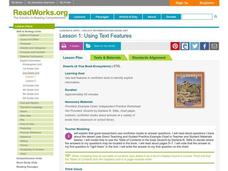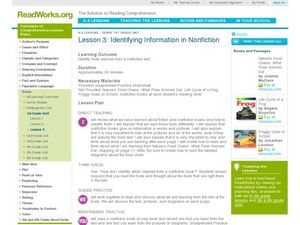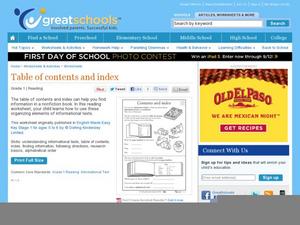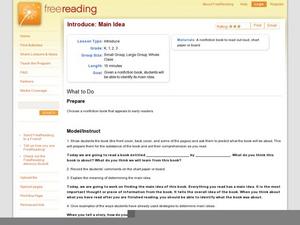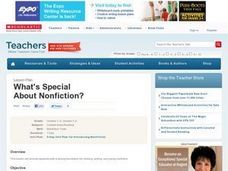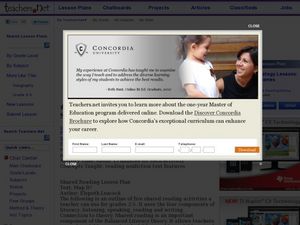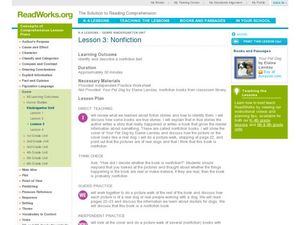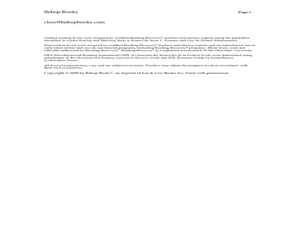Curated OER
Teach Text Features & Read Nonfiction
Elementary schoolers examine the components of reading nonfiction. They use think-alouds to help them complete reading the selected sections. They also identify text features as they read.
Curated OER
Using Text Features
Investigate a "table of contents" with your students! They read the table of contents in Deserts by Darlene R. Stille and predict where the answers to specific questions might be found. Learners complete a worksheet in which they find...
Curated OER
Identifying Features of Nonfiction Text
Learners explore nonfiction text. They identify the cover, title page, and table of contents of a nonfiction book. Pupils work in groups to create a chapter for a nonfiction class book about heroes.
Curated OER
Identifying Information in Nonfiction
Second graders investigate information in non-fiction texts. They review the features of a non-fiction text and read the book Nature's Food Chains: What Polar Animals Eat. Pupils discuss the text features and write down one fact they...
Curated OER
Characteristics of Nonfiction
The second lesson in a series from ReadWorks.org, this lesson continues to explore the difference between fiction and nonfiction texts. The lesson opens with the teacher reviewing a class Venn diagram started in the last lesson....
Curated OER
Discussing Non-Fiction Texts
Discuss non-fiction texts and fact and opinion. Learners discuss the features of non-fiction text, identify how to distinguish fact from opinion, and list ways to display information, including graphs, charts, and diagrams. While this is...
Curated OER
Contents and Index
It's important for your readers to understand features of informational text such as index and table of contents, so give them this visual activity to get started. They read a brief explanation of informational text, then look at an...
Curated OER
Introduce: Main Idea
Begin exploring main idea in a text by telling the class an interesting story. Can they recall the main idea after you finish? What clues told them this was it? Explain that you will apply this concept as you read a nonfiction book....
Curated OER
What's Special About Nonfiction?
Students examine the difference between nonfiction and fictional writing. They identify the characteristics of nonfiction literature and examine how a nonfiction textbook organizes information.
Curated OER
Using Social Studies in Five Shared Reading Lessons: Geography
After several short 15-minute mini-lessons, your learners will gain an understanding of the characteristics of a non-fiction text. Using the book Map It by Elspeth Leacock, your class will become acquainted with non-fiction terms such as...
Curated OER
An Introduction to Nonfiction
Examine the elements of nonfiction writings in this lesson. Learners list common features of nonfiction and compare nonfiction and fiction books on the same topic. Create a Venn diagram comparing and contrasting the two genres.
Curated OER
Introducing Nonfiction
Students are introduced to nonfiction text. In this five esson unti, students explore nonfiction as a genre. They identify the components and text structure of text structure of nonfiction text. Students read a nonfiction passage and...
Pennsylvania Department of Education
Analyzing Key Ideas and Details in Nonfiction
Students explore nonfiction texts. In this language arts lesson, students read a nonfiction text and make predictions. Students identify facts and opinions in the text and draw conclusions as they read.
Curated OER
Lesson 3: Nonfiction
Introduce young readers to the word of non-fiction. They examine the features found in non-fiction books such as, facts, dates, and realistic pictures. They discuss how the images in the book Your Pet Dog depict real dogs doing real...
Curated OER
Who Would Win? Killer Whale vs. Great White Shark Storia Teaching Guide
Teacher guides are wonderful tools with tons of ideas that help you relate content in many different ways. Using the high-interest book, Who Would Win? Killer Whale vs. Great White Shark, learners hone their discussion and reading...
K12 Reader
United States Geography
Encourage reading for information with a text about United States geography. Kids read a short passage about the landforms in the United States, including mountain ranges and natural resources, and answer five reading comprehension...
Curated OER
Anticipation Guides Improve Reading Comprehension
Beginning with anticipation guide strategies is a powerful method for improving reading comprehension. First, list initial ideas for a topic the class will be reading about. These ideas are formulated into statements, some of which are...
Curated OER
Making Predictions by Analyzing Key Ideas and Details
Students make predictions. In this language arts lesson, students read nonfiction texts and make predictions about what they are going to read. Students confirm and revise their predictions as they read the text.
Curated OER
What Do You See at the Pond?
With What Do You See at the Pond?, young readers explore pond life and practice reading strategies. Learners first make predictions and then read the simple story independently. After a second read-through with a partner, kids come...
Curated OER
Lesson 3: Encyclopedias
After being introduced to non-fiction texts, second graders meet a different type of non-fiction text that can help them locate factual information. They discuss and examine all of the features found in typical encyclopedias such as,...
Curated OER
Glossaries
Explore text structure with a focus on the glossary feature in informational texts. Learners read a brief introduction before examining a glossary from a text about plants. They reference it while completing four comprehension questions....
Curated OER
My Community Book
Young learners examine different places in their neighborhood using informational texts. First they identify a place that they like to play and predict if it will be in the nonfiction book Community at Play.They will share their favorite...
Curated OER
Review Parts of a Book
Begin the year with a review of the parts of a book. Exercises in the unit plan ask emergent readers to identify the information on the cover of a book and on the title page, to explain the purpose of a table of contents, and to describe...
Curated OER
Reading Non-Fiction
Students identify the key features of printed non-fiction texts. In this deciphering texts lesson, students watch a video clip of a news program and a children's program to compare presentations. Students also identify characteristics...



